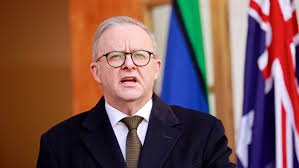Australia has dismissed claims that Israeli interventions influenced its decision to expel Iran’s ambassador, following a series of anti-Semitic attacks in Sydney and Melbourne. The government of Prime Minister Anthony Albanese ordered Ahmad Sadeghi, Iran’s ambassador to Canberra, to leave the country after blaming Tehran for orchestrating the assaults.
“Complete nonsense,” said Australian Minister for Home Affairs Tony Burke during an interview on ABC Radio on Wednesday, responding to suggestions that Israel pushed Australia to act.
Albanese said on Tuesday that Australian intelligence had reached a “deeply disturbing conclusion” that Iran’s government directed at least two attacks targeting the country’s Jewish community. The prime minister described the intelligence as credible and compelling.
In response, Israeli government spokesperson David Mencer praised Australia for taking the threats seriously, claiming that the move followed a “forthright intervention” by Israeli Prime Minister Benjamin Netanyahu. Mencer added that Netanyahu had criticized Albanese personally, asserting that the Australian government had not done enough to address anti-Semitism.
“He made those comments because he did not believe that the actions of the Australian government had gone anywhere near far enough to address the issues of anti-Semitism,” Mencer said.
The ABC reported Mencer’s remarks in an article titled, “Israeli government claims credit for pushing Albanese to expel Iranian diplomats.” The comments came amid heightened tension between Israel and Australia after Albanese announced plans to formally recognize a Palestinian state in September.
Netanyahu previously accused Albanese of being “a weak politician who betrayed Israel and abandoned Australia’s Jews,” further straining diplomatic relations.
Iran rejected Australia’s accusations outright. Ministry of Foreign Affairs spokesman Esmaeil Baghaei said the claims were unfounded and suggested the expulsion was politically motivated. “It seems that this action is taken in order to compensate for the limited criticism the Australian side has directed at the Zionist regime,” Baghaei said. He added that “any inappropriate and unjustified action on a diplomatic level will have a reciprocal reaction.”
The Jewish Council of Australia expressed shock at the apparent involvement of a foreign government in coordinating antisemitic attacks. The council emphasized that politicizing the assaults could further harm the Jewish community.
“The fact that a foreign government appears to be responsible shows how irresponsible it was for the attacks to be used to demonise the Palestine solidarity protest movement,” the council said in a statement. It urged politicians and the media to exercise caution to avoid exacerbating the situation.
Meanwhile, Ilana Lenk, head of public diplomacy at Israel’s embassy in Canberra, shared Australian newspaper headlines highlighting the attacks and warned of broader implications. “We warned Iran wouldn’t stop with Israel or the Jewish people. The West is next isn’t just a slogan, and today Australia sees it,” Lenk wrote on social media.
The expulsions underscore the ongoing tensions in international diplomacy surrounding antisemitic violence and highlight Australia’s stance against foreign interference targeting its Jewish population.
Australia’s move comes as global concern over antisemitic attacks rises, with governments and advocacy groups calling for stronger measures to protect Jewish communities and hold perpetrators accountable. The Albanese government has emphasized that the decision to expel the ambassador is based solely on verified intelligence and national security considerations, not external influence.
As diplomatic reactions unfold, the situation could have broader implications for Australia-Iran relations and regional security dynamics. Authorities continue to monitor developments closely, while maintaining a commitment to safeguarding the Jewish community against further attacks.







